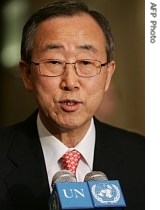2007年VOA标准英语-Sudan Takes Conflicting Stand on UN Peacekeeper(在线收听)
United Nations
17 April 2007
Sudan has agreed to the first large deployment of U.N. peacekeepers and equipment in Darfur to bolster a beleaguered African Union force. But as VOA's Peter Heinlein reports from U.N. headquarters, western diplomats reacted cautiously to the announcement, and Khartoum's U.N. ambassador appeared to contradict it.
Sudan formally notified the United Nations Monday it accepts phase two of a three-phase plan that could lead to eventual deployment of a 20,000 strong hybrid U.N.-African Union peace force in Darfur.
Phase two of the deal reached last November calls for adding 3,000 well-equipped U.N. police and military personnel, backed by helicopter gunships, to strengthen a badly undermanned force of 7,000 A.U. peacekeepers already in the violence-wracked region.
Word of Sudan's acceptance came at the start of two days of intensive U.N. talks on Darfur. Secretary-General Ban Ki-moon is consulting with African Union chief executive Alpha Oumar Konare and two U.N. envoys on a political settlement of the region's four-year civil war.
 |
| UN Secretary-General Ban Ki-moon |
"This is a very positive sign and I and the African Union intend to move quickly to prepare for the deployment of heavy support package and hybrid forces," he said.
But no sooner had those optimistic words been spoken than Sudan's U.N. envoy appeared to contradict the terms of the agreement. Ambassador Abdalmahmood Abdalhaleem suggested to reporters that Khartoum had not agreed to allow blue-helmeted U.N. peacekeepers in Darfur.
"The issue of the U.N. is that, according to the Darfur Peace Agreement, there is no provision for the U.N. in any way," he said. "It is only for the African Union to implement with the Sudanese Authorities and the rebel groups the DPA."
Ambassador Abdalhaleem says Sudan sees the Darfur force as being commanded and staffed by Africans.
"It should be an African force, African command with U.N. backstopping in techniques of control and command," he said. "The command is fully for the African leader of the African commander and African forces."
Western diplomats reacted cautiously, even skeptically, to Sudan's apparently contradictory stance. U.S. Deputy Secretary of State John Negroponte, after meeting Sudanese President Omar al-Bashir in Khartoum, told reporters Sudan faces increased isolation if it fails to accept all phases of the plan.
Washington's acting U.N. Ambassador Alejandro Wolff noted that Sudanese authorities had previously appeared to accept U.N. peacekeepers, only to back away. He said the United States would wait to see when blue-helmeted U.N. troops "actually start to deploy" in Darfur.
"We've been down this path before," noted Wolff, " including here with the U.N. and envoys, including the secretaries-general, so we will see if it happens when it happens. And before it happens, it's impossible to know."
British Foreign Secretary Margaret Beckett was in New York to preside over Monday's Security Council session. She also expressed skepticism about Sudan's statement, given its past record. She suggested the Council should threaten Khartoum with increasing sanctions to ensure it complies with previous agreements.
"The important thing is those who have not cooperated with implementing agreements already been reached understand that that is not a pain-free course," she said.
Darfur's troubles date back to early 2003, when rebels in the remote western region launched an uprising against the Khartoum government. Four years of fighting has left at least 200,000 people dead and driven more than two million others from their homes.